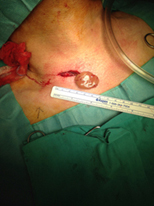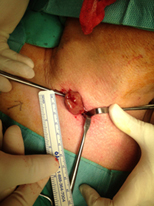
Causes of Parathyroid Tumours, Parathyroid surgery
Although the cause of parathyroid tumours is unknown, it is likely to be related to the immune system. When the tissues in the parathyroid glands grow continuously, the glands will incessantly secrete parathyroid hormones which cause excessive blood calcium levels.
Symptoms of Parathyroid Tumours

In fact, most patients are unaware of any problems with their parathyroid glands until they experience complications. Most of the patients with hyperparathyroidism were diagnosed accidentally on routine blood test on body check. Imbalance in the parathyroid glands will cause re-absorption of calcium from the bone, hence, patients suffer from a higher risk of bone fractures. Some patients may also develop renal stones when there is excessive calcium in the blood, which is then excreted via the kidneys. Some patients may also experience sudden cramping pain in the abdomen. Usually, patients discover that their blood calcium levels are too high during body checkups, and are finally diagnosed with parathyroid tumours after having their parathyroid hormones tested.
Diagnosis for Parathyroid Tumours
Patients may first conduct a blood test to examine the levels of parathyroid hormones in the blood. There may be a risk of parathyroid tumours if the levels are too high. Unless the patient is suffering from kidney disease, most patients will usually have only one benign parathyroid tumour. The doctor may then carry out an MIBI scan to detect which parathyroid gland is in issue. Ultrasound may also be used to examine the growth in the parathyroid glands.
Treatment for Parathyroid Tumours

Usually, parathyroid tumours cannot be treated with medication alone. Surgical removal is usually necessary, which is performed under general anesthesia and takes around 30 minutes. The doctor will use ultrasound to locate the parathyroid tumour and create and incision of around 1.5cm at the side of the neck. The thyroid gland will be pushed forward to facilitate the location and removal of the tumour. Patients may consume food and carry on daily activities hours after surgery, and do not need to take medication. Same day discharge may apply to some young and fit patients
Risks of Treatment
- Usual surgical risks, including bleeding and infection.
The information provided on this website is for educational purposes only. Please consult your physicians before considering treatment or for detailed medical advice.
 Thyro is part of the Esteem Surgical
Thyro is part of the Esteem Surgical